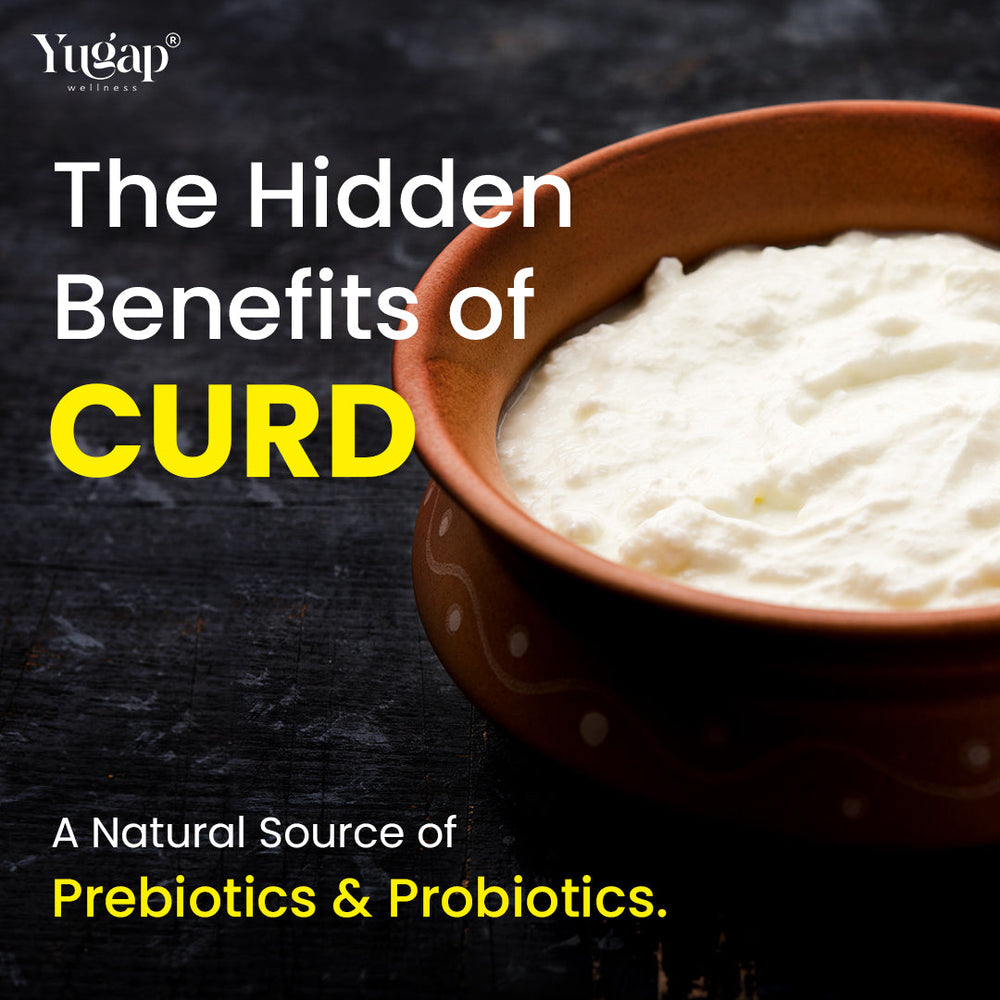
Learn the untold hidden benefits of curd, which is a natural prebiotic and probiotic. Find how it can be used as a gut health supplement to increase natural digestion.
A cooling and delicious dairy product, curd or yoghurt, as some people refer to it, is more than merely a favourite food. It is itself a wonder of probiotic or friendly bacteria. Within the past year, there has been a rampage over gut health supplements, digestive health sachets and daily probiotic supplements. However, what most people fail to note is the fact that curd is naturally both probiotic and prebiotic enriched, hence being one of the most convenient and fastest means of enhancing gut health without chemical intervention. This blog investigates the process behind curd and its secret health advantages as well as why it needs to be a component on the basis of any natural plan promoted to support digestive health.
What makes curd a natural gut health supplement?
Curd is a product obtained by bacterial treatment of milk. This is done by adding live cultures of bacteria to warm milk, largely Lactobacillus bulgaricus and Streptococcus thermophilus and that the milk thickens as the bacteria feed on lactose. This natural and basic procedure produces food that has plenty of live microorganisms that, once they enter your body, continue to live in your intestines.
Why curd qualifies as a gut health supplement:
-
Probiotic-rich: Curd provides probiotics in the form of live and active cultures along with a replenishment of the gut microbiome.
-
Provides prebiotics in milk sugars: Which nourish already-present good bacteria in your intestines.
-
Restores the gut flora: Curd also regulates the flora naturally as opposed to other synthetic supplements during times of need.
-
Immune and digestive health: It has bacteria organisms that enable food digestion and boost intestinal lining.
-
Available and cheap: It is not perishable in short haulage, as it does not need refrigeration and it is also easily obtainable.
Compared to commercial digestive health sachets or probiotic sachets, curd is a holistic, natural solution with no added preservatives or fillers.
Digestive and metabolic benefits of curd
One of curd’s standout qualities is its effect on digestion. When consumed regularly, it acts as a buffer in the stomach and supports a healthy digestive rhythm.
How curd supports digestion:
-
Improves lactose digestion: Live cultures partially digest lactose and, therefore, lactose-intolerant persons are able to digest lactose.
-
Combats bloating and constipation: Curd has probiotics, which ensure coordination of bacteria in the bowel and ease the process of bowel movement.
-
Improves nutrient absorption: Curd is a good source of absorption of calcium, vitamin B complex, and magnesium through the good bacteria content of curd.
-
Reduces acid in the stomach: Curd acts to inhibit acid secretion in the stomach since it turns the stomach reaction more alkaline.
-
Fights microorganisms: Curd probiotics expel the ugly bacteria and boost the immune system.
According to WebMD, probiotics like those found in curd help reduce bloating, support bowel regularity, and protect the gut from harmful bacteria (What Are Probiotics?, 2024).
Prebiotics and probiotics: the perfect combination in curd
Many gut health products emphasise probiotics but overlook prebiotics. Curd offers both, making it a dual-action digestive health powerhouse (Probiotics and Prebiotics: What You Should Know, n.d.).
What’s the difference between prebiotics and probiotics?
-
Probiotics: These are living microorganisms, which are of health benefits when taken in sufficient quantities.
-
Prebiotics: These are indigestible fibres or nutrients that feed on good intestinal bacteria and allow them to grow.
Why curd is superior to many daily probiotic supplements:
-
Prebiotics from milk sugars support the survival and activity of probiotics in curd.
-
Live cultures directly restore gut microbial balance.
-
Natural fermentation allows curd to retain both probiotics and the fuel (prebiotics) needed to grow them in your gut.
-
No synthetic carriers or additives, unlike some digestive health sachets or probiotic capsules.
This unique synergy makes curd far more efficient in improving gut health naturally than most isolated gut health supplements.
How curd compares to probiotic sachets and supplements
Many people spend heavily on branded gut health supplements or probiotic sachets, not realising that natural options like curd offer comparable—if not superior—benefits.
Curd vs Probiotic Sachets:
-
Bioavailability: The curd has live cultures which will be able to perform as soon as they experience the environment, whereas sachets just need digestion or reactivation.
-
Affordable: Curd is cheap, and it can be prepared at home; sachets and digestive-health supplements are usually expensive.
-
Stability: Freshly prepared or homemade curd does not rely on the technology of packaging to retain the live bacteria.
-
Digestibility: Curd is easy on the stomach and, in many cases, more appropriate for people with sensitive stomachs.
-
Flexibility: Curd can be eaten plain, in smoothies or with food – it does not need any blending or measuring.
Healthline also notes that fermented dairy like yoghurt and curd are some of the most researched and effective forms of natural probiotics (Probiotics and Prebiotics: What You Should Know, n.d.).
Daily ways to improve gut health naturally with curd
Incorporating curd into your routine doesn't require an overhaul of your diet. It’s simple, flexible, and easy to blend with existing habits.
Tips for daily consumption:
-
Breakfast shot: Put a bowl of oats or a smoothie with a scoop of curd.
-
Probiotic lunchtime snack: A spoonful of fruits, curd and honey.
-
Cooling side of lunch: Combine it with rice, lentils/ or spicy dishes so that they could be digested more easily.
-
Nighttime assistance in digestion: After your dinner, take curd without cardamom or cumin and with a pinch of rock salt.
-
Fermented curd water (buttermilk): Thin out the curd in a bowl of water and add some spices like ginger, curry leaves or cumin and drink it as a refreshing probiotic beverage.
To have optimal results, use unsweetened plain curd prepared at home or using reliable organic sources.
Curd and Antibiotic Recovery
Antibiotics do not discriminate on the kind of bacteria to kill when consumed, they kill all the bad and the good bacteria in your system. This usually distorts the balance and causes side effects which may include diarrhoea, yeast infections, and sensitivity to the gut. Curd is a good source of natural probiotics so it will replenish your gut flora following the use of antibiotics.
Why curd is vital post-antibiotics:
-
Cures beneficial flora: It replenishes good bacteria that are killed, like Lactobacillus.
-
Limits the side effects: Avoids the bloating, nausea and antibiotic-induced diarrhoea.
-
Enhances the healing of the intestine: Accelerates the recreation of the microbiome.
The role of curd in preventing leaky gut
Leaky gut syndrome occurs when the intestinal lining is compromised, allowing toxins to leak into the bloodstream. This triggers inflammation, fatigue, and even autoimmune reactions. Curd supports the rebuilding of this gut barrier.
How curd protects against leaky gut:
-
Tightens gut: Its live cultures enhance tight junctions of the intestine lining.
-
Minimises systematic low-level inflammation: Decreased leakage of the gastrointestinal system leads to a decrease in the body inflammatory response.
-
Enhances immune modulation: Proper bacterial flora in the guts decreases hyper-activation of the immune system.
Cure for managing irritable bowel syndrome (IBS)
IBS is as prevalent as millions of people worldwide with this condition experience irregular bowel movements, gas, and discomfort. The probiotic content of curd could also be instrumental in appeasing such symptoms in a natural manner.
Advantages of curd to the victim of IBS:
-
Decreases bloating and expands the bowel: The anaesthetic characteristics relax the bowel.
-
Cures constipation: When one balances his or her probiotics, much is facilitated on the stool content and frequency.
-
Relieves gut hypersensitivity: Decreases the responsiveness of the gut in response to food stimulus.
Curd enhances nutrient absorption
A healthy gut isn't just about digestion—it’s about what your body can absorb. Probiotic-rich foods like curd improve the uptake of vitamins and minerals by optimising the gut microbiome.
Nutrient support benefits of curd:
-
Increased uptake of B12 and iron: Harmonious intestinal bacteria increase the availability of nutrients.
-
Enhances absorption of calcium: Bones and muscles are dependent on calcium.
-
Increases folate production: Good gut bacteria help in the production of folate.
Curd for gut-skin connection
The gut and skin are directly linked through the microbiome. When your digestion is healthy, your skin tends to be clearer and more balanced.
Skin benefits from improved gut health via curd:
-
Minimises acne and inflammation: The fewer toxins in the gut, the less acne.
-
Controls the production of oil: Good bacteria balanced the sebum.
-
Increases skin hydration: A good intestinal tract keeps nutrient and water balance.
Common myths about curd and digestion
Despite its popularity, curd is often misunderstood or misused. Let’s bust some myths.
Debunking misconceptions:
-
“Curd causes cold or sinus issues.”
In fact, moderate consumption of fresh curd (not cold or stale) improves immunity and helps fight infection-causing microbes. -
“Curd and milk have the same benefits.”
Curd is fermented and contains live bacteria, while milk doesn’t offer probiotics. benefits in the same way. -
“Curd should be avoided at night.”
For those with no sinus issues, curd at dinner can aid digestion and prevent acid reflux when consumed at room temperature. -
“Packaged flavoured yoghurt is equal to curd.”
Most flavoured yoghurts contain sugar, preservatives, and fewer live cultures than fresh curd.
Conclusion
Curd is the natural response to the costly digestion health grams and drugs of synthesised gut well-being. Curd has all that your digestive system requires: the perfect proportion of prebiotics and probiotics. Nobody should ever undermine the power of the kitchen when it comes to strengthening the gut since it is the main source of foods rich in natural goodness. Curd is easy, semi-flexible and performs not only in digestion but also in your immune system, skin and energy too. Go natural and enjoy natural digestive support every day.
FAQs
Q1: How much curd should I take in a day and be healthy in terms of gut?
One to two servings (one-half to one cup) of plain curd on a daily basis is all that most people could need to maintain the balance in their guts and facilitate the process of digestion.
Q2: Are lactose intolerants allowed to consume curd?
Yes. Curd is also much easier to digest than milk, as much of the lactose content has been broken down through the fermentation process, hence being bearable.
Q3: What about curd? is that sufficient or do I have to continue taking probiotic sachets?
The probiotics can be found in curd, which will serve the purpose of general wellness. Yet, gel packs or everyday probiotic supplements can be of assistance in the case of gut disorders, antibiotics, or increased doses of bacteria.
Q4 In what way does yellow dollop, aka yoghurt, relate to curd?
Not necessarily. Most commercial yoghurts are sweetened or pasteurised, which lowers their probiotic quality. Consume live culture unsweetened curd to have the best of it.
Q5: Do probiotics die with the heating of the curd?
Yes. It is possible to eliminate the living bacteria by heating curd to more than 115°C (46°C). When eaten fresh and at room temperature, it is best.
References
- Cpt, E. L. M. R. (2025, May 30). 11 best probiotic supplements for 2025, according to dietitians. Healthline. https://www.healthline.com/nutrition/best-probiotic-supplement
- Probiotics and prebiotics: What you should know. (n.d.). Mayo Clinic. https://www.mayoclinic.org/healthy-lifestyle/nutrition-and-healthy-eating/expert-answers/probiotics/faq-20058065
- What are probiotics? (2024, November 9). WebMD. https://www.webmd.com/digestive-disorders/what-are-probiotics
